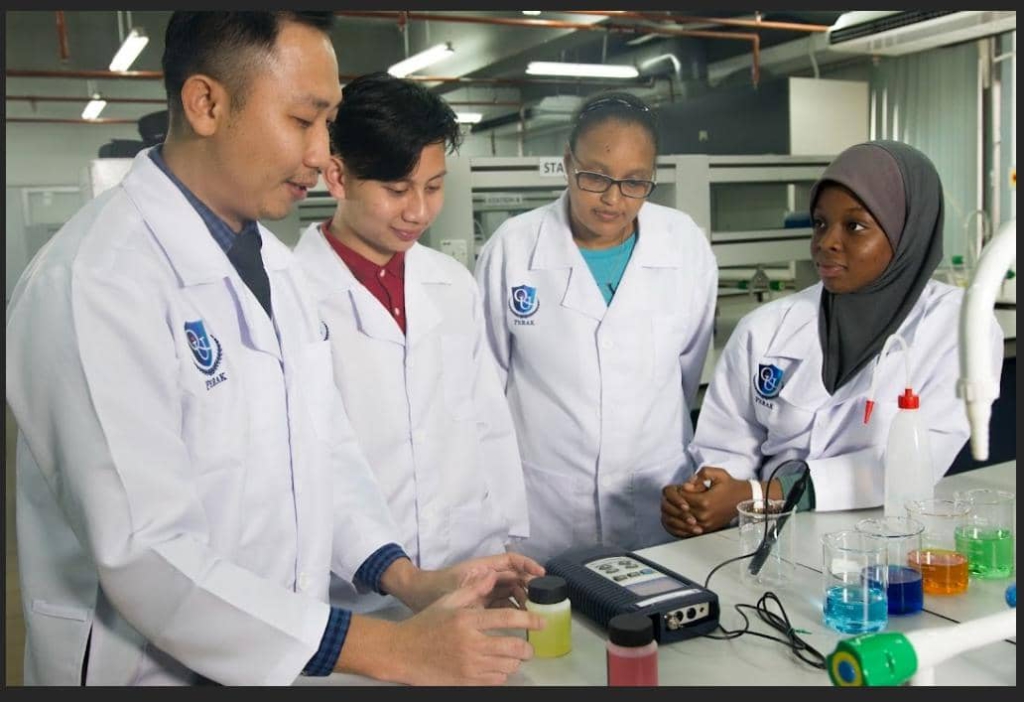The QI Group, a diversified multinational entity with a wide range of subsidiary companies in nearly 30 countries, has built a university that aspires to be the “Harvard” of Asia.
QI Group’s Quest International University (QIU), is a private Malaysian university established in 2011 under a public-private partnership with the State Government of Perak.
It is located in the state capital of Ipoh, in Perak which lies in the western coast of peninsular Malaysia. QIU offers cutting-edge and comprehensive Foundation, Diploma, Bachelor’s Degree and Postgraduate programmes.
The US-trained Chief Operating Officer of the University, Mr. Nicholas Goh, a passionate and experienced educationist, hosted a number of journalists from West Africa at the university’s campus, where he explained in detail, the institution’s mission, vision, philosophy, uniqueness, achievements, and teaching methodology, all aimed at churning out highly functional, problem-solving, market-fit and future-ready graduates.
An enthusiastic Mr. Goh recounted the University’s history. He narrated how the visionary entrepreneur Dr Vijay Eswaran, who also serves as the Council Chairman for the University, conceived the idea of establishing a University with global excellence and a legacy of world-class education, delivered from Ipoh, a charming town known for food, culture, history and the arts, to Malaysia and to the rest of the world.
According to Mr. Goh, QIU’s education focuses on all-round development of students and covers a wide range of industries and sectors. The University has the following faculties and centres: Faculty of Medicine and Health Sciences, Business & Management, Computing & Engineering, Integrated Life Sciences, Pharmacy, Social Sciences, Centre for Postgraduate Studies and Centre for Research and Innovation.

QIU offers courses ranging from Foundation in Science, Environmental Technology, Biotechnology MSc, PhD (Science), Foundation in Business, Business Administration, Hotel Management, Culinary Arts, Finance, Accountancy, Hospitality Management MBA, PhD (Business Administration), DBA, Pharmacy, Pharmacy Bridge Programme with Pacific University, Oregon, IT, Mechatronics Engineering, Computer Science, Actuarial Science, Biomedical Sciences, MBBS, MSc Microbiology, Foundation in Arts, Mass Communication (Journalism & Advertising), Corporate Communication, Early Childhood & Special Needs Education to Psychology (BA, MEd, MA) among others.
Mr. Goh emphasized that the University’s philosophy of excellence is hinged on four cardinal pillars: knowledge, skills, attitude, and student experience. “Students are taught to demonstrate systematic and comprehensive knowledge of facts, concepts, theories and technical knowledge in their field of study. They are trained to exhibit cognitive, practical, digital, numeracy and entrepreneurial skills. They are shaped to develop a resilient, proactive, ambitious, ethical, professional and socially-responsible attitude. Their overall student experience is designed to be relevant, enlightening, practical and future-ready.”
“They are taught to acquire more varied, broader and specialised knowledge, critical thinking, analytical, operational and problem-solving skills, coupled with responsible, resilient and progressive attitude which could be applied in different situations in and outside the field of work to help them compete, withstand, recover or cope with challenging conditions anywhere.”
He reiterated that: “At QIU, we believe no one should be left behind. To accomplish this, we have put strategies and initiatives in place that allow students achieve their goals at their own pace. The Enhanced Academic Support for You (EASY) initiative provides extra support for students who may be facing difficulties with their lessons. If they have problems or issues in class, their lecturers provide extra guidance until they are able to fully grasp the concept of the topic.”
“They are also taught time management, goal setting and how to cite and reference properly. Peer Assisted Study Sessions (PASS) are conducted by students for students. During PASS, appointed student leaders will facilitate the review of lectures, discussion on tutorials, or revision for final examinations. Supplementary tutoring is available for students, augmenting the tutorials conducted by course lecturers. Our finishing school, led by the Career and Professional Development Centre helps graduates build their resume and polish their interviewing and communication skills. The CPDC’s Career Portal connects alumni with hundreds of job vacancies and internship opportunities around the region. Our graduates are employed in a diverse range of fields and industries, with many starting their careers in multinational companies. Employability for 2019 was 92%, which went down to 81% in 2020 due to the pandemic, but bounced back to 93% last year (2021).
QIU is one of 19 Malaysian universities to be listed in the Times Higher Education Impact Ranking 2021. The University was awarded a 4-star rating by the Malaysian Ministry of Higher Education. Its medical degrees are fully accredited by the Malaysian Medical Council, Maldives Medical and Dental Council and the National Medical Council of India, among others.
QIU’s student population is diverse with students from Malaysia and other parts of the world including Africa.
While taking the visibly-impressed journalists from West Africa on a tour of the modern campus, Mr. Goh mentioned that the University is open to admitting students from any part of the world and that people should be wary of anyone or group of people who may want to use the School’s name or identity for unethical activities. Details of the University’s admission requirement and application guidelines are available on its website.





